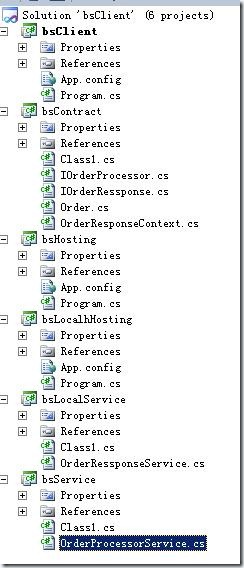跟着Artech学习WCF(5) Responsive Service 与自定义Soap Message Header
记得以前看.NET各类框架教程在介绍SOAP时经常提到Soap Header 以前一直认为这个玩意就是个理论
应该和具体的编码和应用无关
后来在看到一些关于SOAP安全的书可以在header里 进行加密解密信息的存储 用于安全方面的验证
但一直苦于这个玩意到底是神马东西,一直没见过代码,今天Artech在介绍wcf时无意间解开期神秘的面纱,真是令人感到意外的惊喜![]()
项目结构图如下
代码如下
using System;
using System.Collections.Generic;
using System.Linq;
using System.Text;
using System.Configuration;
using System.ServiceModel;
using System.Messaging;
using bsContract;
namespace bsClient
{
class Program
{
static void Main(string[] args)
{
Order order1 = new Order(Guid.NewGuid(), DateTime.Today.AddDays(5), Guid.NewGuid(), "Supplier A");
Order order2 = new Order(Guid.NewGuid(), DateTime.Today.AddDays(-5), Guid.NewGuid(), "Supplier A");
string path = ConfigurationManager.AppSettings["msmqPath"];
Uri address = new Uri(path);
OrderResponseContext context = new OrderResponseContext();
context.ResponseAddress = address;
ChannelFactory<IOrderProcessor> channelFactory = new ChannelFactory<IOrderProcessor>("defaultEndpoint");
IOrderProcessor orderProcessor = channelFactory.CreateChannel();
using (OperationContextScope contextScope = new OperationContextScope(orderProcessor as IContextChannel))
{
Console.WriteLine("Submit the order of order No.: {0}", order1.OrderNo);
OrderResponseContext.Current = context;
orderProcessor.Submit(order1);
}
using (OperationContextScope contextScope = new OperationContextScope(orderProcessor as IContextChannel))
{
Console.WriteLine("Submit the order of order No.: {0}", order2.OrderNo);
OrderResponseContext.Current = context;
orderProcessor.Submit(order2);
}
Console.Read();
}
}
}
=============================
using System;
using System.Collections.Generic;
using System.Linq;
using System.Text;
using System.ServiceModel;
using System.Runtime.Serialization;
namespace bsContract
{
[ServiceContract]
[ServiceKnownType(typeof(Order))]
public interface IOrderProcessor
{
[OperationContract(IsOneWay = true)]
void Submit(Order order);
}
}
============================
using System;
using System.Collections.Generic;
using System.Linq;
using System.Text;
using System.ServiceModel;
using System.Runtime.Serialization;
namespace bsContract
{
[ServiceContract]
public interface IOrderRessponse
{
[OperationContract(IsOneWay = true)]
void SubmitOrderResponse(Guid orderNo, FaultException exception);
}
}
========================================
using System;
using System.Collections.Generic;
using System.Linq;
using System.Text;
using System.Runtime.Serialization;
namespace bsContract
{
[DataContract]
public class Order
{
#region Private Fields
private Guid _orderNo;
private DateTime _orderDate;
private Guid _supplierID;
private string _supplierName;
#endregion
#region Constructors
public Order(Guid orderNo, DateTime orderDate, Guid supplierID, string supplierName)
{
this._orderNo = orderNo;
this._orderDate = orderDate;
this._supplierID = supplierID;
this._supplierName = supplierName;
}
#endregion
#region Public Properties
[DataMember]
public Guid OrderNo
{
get { return _orderNo; }
set { _orderNo = value; }
}
[DataMember]
public DateTime OrderDate
{
get { return _orderDate; }
set { _orderDate = value; }
}
[DataMember]
public Guid SupplierID
{
get { return _supplierID; }
set { _supplierID = value; }
}
[DataMember]
public string SupplierName
{
get { return _supplierName; }
set { _supplierName = value; }
}
#endregion
#region Public Methods
public override string ToString()
{
string description = string.Format("Order No.\t: {0}\n\tOrder Date\t: {1}\n\tSupplier No.\t: {2}\n\tSupplier Name\t: {3}",
this._orderNo, this._orderDate.ToString("yyyy/MM/dd"), this._supplierID, this._supplierName);
return description;
}
#endregion
}
}
===============================
using System;
using System.Collections.Generic;
using System.Linq;
using System.Text;
using System.Runtime.Serialization;
using System.ServiceModel;
namespace bsContract
{
[DataContract]
public class OrderResponseContext
{
private Uri _responseAddress;
[DataMember]
public Uri ResponseAddress
{
get { return _responseAddress; }
set { _responseAddress = value; }
}
public static OrderResponseContext Current
{
get
{
if (OperationContext.Current == null)
{
return null;
}
return OperationContext.Current.IncomingMessageHeaders.GetHeader<OrderResponseContext>("OrderResponseContext", "Contract");
}
set
{
MessageHeader<OrderResponseContext> header = new MessageHeader<OrderResponseContext>(value);
OperationContext.Current.OutgoingMessageHeaders.Add(header.GetUntypedHeader("OrderResponseContext", "Contract"));
}
}
}
}
========================================================
using System.Linq;
using System.Text;
using System.ServiceModel;
using System.Configuration;
using System.Messaging;
using bsService;
using bsContract;
namespace bsHosting
{
class Program
{
static void Main(string[] args)
{
string path = ConfigurationManager.AppSettings["msmqPath"];
if (!MessageQueue.Exists(path))
{
MessageQueue.Create(path);
}
using (ServiceHost host = new ServiceHost(typeof(OrderProcessorService)))
{
host.Opened += delegate
{
Console.WriteLine("The Order Processor service has begun to listen");
};
host.Open();
Console.Read();
}
}
}
}
===================================================
using System;
using System.Collections.Generic;
using System.Linq;
using System.Text;
using System.Configuration;
using System.ServiceModel;
using System.Messaging;
using bsLocalService;
using bsContract;
namespace bsLocalhHosting
{
class Program
{
static void Main(string[] args)
{
string path = ConfigurationManager.AppSettings["msmqPath"];
if (!MessageQueue.Exists(path))
{
MessageQueue.Create(path);
}
using (ServiceHost host = new ServiceHost(typeof(OrderRessponseService)))
{
host.Opened += delegate
{
Console.WriteLine("The Order Response service has begun to listen");
};
host.Open();
Console.Read();
}
}
}
}
=============================================
using System;
using System.Collections.Generic;
using System.Linq;
using System.Text;
using System.ServiceModel;
using bsContract;
namespace bsLocalService
{
public class OrderRessponseService : IOrderRessponse
{
#region IOrderRessponse Members
public void SubmitOrderResponse(Guid orderNo, FaultException exception)
{
if (exception == null)
{
Console.WriteLine("It's successful to process the order!\n\tOrder No.: {0}", orderNo);
}
else
{
Console.WriteLine("It's fail to process the order!\n\tOrder No.: {0}\n\tReason: {1}", orderNo, exception.Message);
}
}
#endregion
}
}
==================================
using System;
using System.Collections.Generic;
using System.Linq;
using System.Text;
using System.ServiceModel;
using System.Net.Security;
using bsContract;
namespace bsService
{
public class OrderProcessorService:IOrderProcessor
{
private void ProcessOrder(Order order)
{
if (order.OrderDate < DateTime.Today)
{
throw new Exception();
}
}
void IOrderProcessor.Submit(Order order)
{
Console.WriteLine("Begin to process the order of the order No.: {0}", order.OrderNo);
FaultException exception = null;
if (order.OrderDate < DateTime.Today)
{
exception = new FaultException(new FaultReason("The order has expried"), new FaultCode("sender"));
Console.WriteLine("It's fail to process the order.\n\tOrder No.: {0}\n\tReason:{1}", order.OrderNo, "The order has expried");
}
else
{
Console.WriteLine("It's successful to process the order.\n\tOrder No.: {0}", order.OrderNo);
}
NetMsmqBinding binding = new NetMsmqBinding();
binding.ExactlyOnce = false;
binding.Security.Transport.MsmqAuthenticationMode = MsmqAuthenticationMode.None;
binding.Security.Transport.MsmqProtectionLevel = ProtectionLevel.None;
ChannelFactory<IOrderRessponse> channelFacotry = new ChannelFactory<IOrderRessponse>(binding);
OrderResponseContext responseContext = OrderResponseContext.Current;
IOrderRessponse channel = channelFacotry.CreateChannel(new EndpointAddress(responseContext.ResponseAddress));
using (OperationContextScope contextScope = new OperationContextScope(channel as IContextChannel))
{
channel.SubmitOrderResponse(order.OrderNo, exception);
}
}
}
}
=====================================
配置部分
bsClient 的配置
<?xml version="1.0" encoding="utf-8" ?>
<configuration>
<appSettings>
<add key="msmqPath" value="net.msmq://localhost/private/orderresponse"/>
</appSettings>
<system.serviceModel>
<bindings>
<netMsmqBinding>
<binding name="MsmqBinding" exactlyOnce="false" useActiveDirectory="false">
<security>
<transport msmqAuthenticationMode="None" msmqProtectionLevel="None" />
</security>
</binding>
</netMsmqBinding>
</bindings>
<client>
<endpoint address="net.msmq://localhost/private/orderprocessor" binding="netMsmqBinding"
bindingConfiguration="MsmqBinding" contract="bsContract.IOrderProcessor" name="defaultEndpoint" />
</client>
</system.serviceModel>
</configuration>
==============
bsHosting 的配置
<?xml version="1.0" encoding="utf-8" ?>
<configuration>
<appSettings>
<add key="msmqPath" value=".\private$\orderprocessor"/>
</appSettings>
<system.serviceModel>
<bindings>
<netMsmqBinding>
<binding name="MsmqBinding" exactlyOnce="false" useActiveDirectory="false">
<security>
<transport msmqAuthenticationMode="None" msmqProtectionLevel="None" />
</security>
</binding>
</netMsmqBinding>
</bindings>
<services>
<service name="bsService.OrderProcessorService">
<endpoint address="net.msmq://localhost/private/orderprocessor" binding="netMsmqBinding"
bindingConfiguration="MsmqBinding" contract="bsContract.IOrderProcessor" />
</service>
</services>
</system.serviceModel>
</configuration>
================================================
bsLocalhHosting 配置
<?xml version="1.0" encoding="utf-8" ?>
<configuration>
<appSettings>
<add key="msmqPath" value=".\private$\orderresponse"/>
</appSettings>
<system.serviceModel>
<bindings>
<netMsmqBinding>
<binding name="msmqBinding" exactlyOnce="false">
<security>
<transport msmqAuthenticationMode="None" msmqProtectionLevel="None" />
</security>
</binding>
</netMsmqBinding>
</bindings>
<services>
<service name="bsLocalService.OrderRessponseService">
<endpoint address="net.msmq://localhost/private/orderresponse" binding="netMsmqBinding"
bindingConfiguration="msmqBinding" contract="bsContract.IOrderRessponse" />
</service>
</services>
</system.serviceModel>
</configuration>
test





